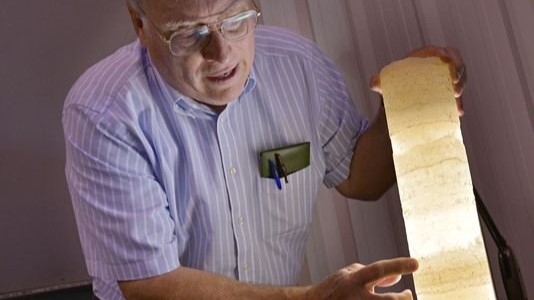About a mile-and-a-half underground in north-central Michigan, an almost-forgotten reserve of the potassium-rich mineral salt potash could be worth $65 billion to the Michigan economy.
A widely used agricultural fertilizer, Michigan's potash may be some of the purest found anywhere in the world. It's spurring a Colorado engineer and geologist's plan for a more than $700-million mining and processing facility in Osceola County.
"This is a transformative, generational opportunity for Osceola County," said Michigan Potash CEO Theodore Pagano. "One of the world's tightest-controlled commodities sits in Evart Township, and it's the highest-graded ore by a factor of two. And it sits in a location better than anybody else's in the world."
The climate is opportune for Pagano's effort. President Donald Trump in December issued a presidential order to ensure secure and reliable U.S. supplies of 35 minerals, including potash, considered critical to economic and national security.
Read more:
But retrieving Michigan's potash will take a huge amount of groundwater. The Department of Environmental Quality has already approved Michigan Potash's request to extract 725 million gallons of groundwater annually, almost 2 million gallons per day — more than five times the controversial groundwater withdrawal by Nestlé North America's Ice Mountain bottled water operation only a few miles away.
"This is in the middle of a really sensitive, elaborate wetland area — lots of lakes, streams and ponds, pristine wetlands — and the plant is in the worst possible location in it," said Peggy Case, spokesperson for the nonprofit Michigan Citizens for Water Conservation.
Michigan Potash proposes to use solution mining — wells not unlike typical oil and gas fracking wells, but that would inject brine water thousands of feet underground to dissolve potash, bring it to the surface, and then dry and reconstitute it. The operation would also generate marketable, table-grade salt. Brine water waste would be disposed of deep underground via disposal wells.
The company intends to mine about 650,000 tons of potash per year from the facility it would build in Evart Township, about 5 miles southwest of the city of Evart. Known potash reserves in the area could sustain that amount of annual extraction for 150 years, before even further exploring the area for potentially more, Pagano said.
An economic boost for town
The rural community of fewer than 2,000 residents is cautiously optimistic, said Evart Township Supervisor Chad Booher.
"There's definitely excitement —we just want to make sure everything is done right," he said. "There's an opportunity for a huge, huge economic influx. We need the jobs."
Michigan Potash officials cite the potential for 150 permanent jobs, which could grow to 300 jobs as the facility reaches its mining and processing potential.
This may only be scratching the surface of what's a mile-and-a-half below, said William Harrison III, a geology professor emeritus at Western Michigan University who curates the Michigan Geological Repository for Research and Education at the university, a large collection of rock and mineral samples from throughout Michigan.
"(Pagano) is only looking at a small area," he said. "This stuff is under more than nine counties in northern Michigan. There's room in the state for other operators to do the same thing, but it's cost-intensive.
"If people want to make Michigan a hub of fertilizer production, I think it's possible."
It's not that potash is scarce, but that its production is controlled by a very few, Pagano said. There are only 10 producers worldwide, with only two in North America, all with their principal assets in Canada, he said.
"The United States imports 94% of the potash it uses," he said. "Farmers use roughly 10 million tons a year, and we're currently producing around 300,000 tons domestically."
The limited locations where large potash reserves exist drive its tightly controlled production, Harrison said.
"It just doesn't occur everywhere," he said. "Where it does occur, it usually occurs in pretty significant abundance."
Like sodium chloride — salt — potassium chloride, or "muriate of potash," developed very long ago, before the dinosaurs, Harrison said. Back then, Michigan was covered by an ancient sea, and because it was in a sedimentary basin — a low spot in the Earth's crust — the seawater would pool here, he said. Over hundreds of millions of years of flooding, pooling and evaporation, salt deposits emerged — think of the vast Detroit Salt Mine beneath the city — as well as potash deposits.
One of the appeals of the Michigan deposits are their close proximity to where the potash is most sought — the Corn Belt of the northern Plains States and Midwest, Pagano said.
Michigan's potash stash almost forgotten
Michigan's multi-billion-dollar potash potential would likely have been unknown, discarded and forgotten, were it not for Harrison's extra efforts a decade ago.
A small operation mined salt and potash in Osceola County, near the tiny village of Hersey, going back to the 1980s. The mine's owner in 2008, Mosaic, was looking to cease operations, which had never amounted to much, as the company shifted its priorities to a multi-billion-dollar expansion of its potash mining in the Canadian province of Saskatchewan.
"Hersey was considered a pain in the butt — it only produced 1% of their total output," said Ward Forquer, who sold the potash out of the facility from 1984 to 2006 and who is now working with Pagano's Michigan Potash team.
"They never did grasp the potential that Michigan brought."
As they pulled up stakes, Mosaic had a number of core samples — drilled from deep under the area around the Hersey mining facility — that it was about to throw away.
"It was a small-time operation for them, compared to their giant mines up in Canada," Harrison said.
"They just said, 'We're going to get rid of this stuff. If some university wants this for educational purposes, they can have it.' "
Harrison quickly confirmed his interest in the samples, and headed in a pickup to gather them from a location in Evart.
"It was an old, three-bedroom ranch house, and the whole house was filled with these boxes, 3 feet long, 4 inches square," he said.
The boxes were well-marked, containing details of when, where and from how deep the core samples were taken.
"Turns out they had about 17,000 feet of this rock material. I said, 'I'm going to need a bigger truck, and a few more people.' "
The timing of the Michigan Geological Repository's acquisition was serendipitous for Pagano. The Colorado engineer and geologist had an interest in potash, and knew Michigan was one of the few places in the U.S. to look for it. Pagano heard about the samples Harrison had obtained, and asked whether he could take a look.
Pagano told Harrison he was interested in seeing "the bad core," to compare it to better core samples and get a sense of where the best rock for potash was located.
"We take the box down, we open it up, and it is just like everything else. It is perfect," Pagano said. "It is such a high grade of KCl (potassium chloride, or potash) ore, you can see through it. ... There is no bad rock in Michigan. At all. It is amazing."
Samples of the cores were sent to a laboratory in Saskatchewan for analysis, and they tested at 60% potassium chloride. For comparison, a leading U.S. mine in New Mexico that recently stopped operating had potash at about 9% purity, Pagano said.
"In Saskatchewan, some of their best beds, they're producing maybe 30% pure potash — the 25% mark is more standard," he said. "This is better than that by two."
Pagano and his team spent the years between 2011 and 2014 negotiating mineral leases with property owners in the area: "Over 450 leases, 450 different negotiations," he said.
Concerns about water remain
Michigan Potash proposes to construct eight solution mining wells to extract the potash and food-grade salt, with three brine disposal wells.
"It sounds like a large operation, but it's analogous to drilling 11 oil and gas wells 7,600 feet down," Pagano said. "We do it on a little, 2.5-acre plot."
Michigan Potash will also be able to re-use the groundwater it extracts, Pagano said.
"You bring it back up, you drop out the solids and then send the salt brine down again, in a closed-loop, recycling system," he said.
The U.S. Environmental Protection Agency approved required federal permits for the mining and disposal wells last summer. The DEQ is still considering the proposal, but has indicated support for the project as well.
The Evart Township Board approved in February the creation of an industrial district on about 100 acres of land near 120th Avenue, proposed as the site of Michigan Potash's extraction and processing facility. The step allows the company to pursue state tax abatement, Booher said.
Gov. Rick Snyder held a summit last month highlighting how state government could help industry better tap into the economic potential of Michigan's natural resources, including oil and gas drilling and mineral mining.
For Case and Michigan Citizens for Water Conservation, the potash proposal is just too much water and not enough answers.
"It's a huge amount of water — 1,200 gallons per minute — way more than Nestlé is taking about 8 miles away," she said, referring to the controversial Ice Mountain bottled water company.
"It's coming out of the same aquifer. There's no end point. There's no limitation on how long they use that water, how much they can take in a year. It's a disaster waiting to happen."
At least 36 old oil and gas well bores occurred in the area years ago, with no guarantees they were properly capped once closed, Case said.
"There's a real danger of migration of these wastes," she said. "The company and the DEQ say, 'It's just salt brine.' Salt brine is toxic to anything that tries to live in a wetland."
Forquer said he believes in Osceola County's potash promise and in Pagano.
"It's environmentally safe. It provides good jobs," Forquer said.
"Ted understands the value of the deposit; what it brings to the United States, the agricultural industry. And that's what I've felt all along."
Construction of facilities could occur as quickly as this year, if all needed approvals are ultimately obtained, Pagano said.
"And if it doesn’t happen yet this year, the rock isn’t going to go anywhere," he said.
Contact Keith Matheny: 313-222-5021 or kmatheny@freepress.com. Follow on Twitter @keithmatheny.
Potash mining in Osceola County? Monday's the last day to tell the state DEQ what you think
Michigan Potash proposes a solution mining operation featuring eight mining wells and three processed brine disposal wells in Osceola County's Evart Township. The operation would use up to 725 million gallons of groundwater per year.
The Michigan Department of Environmental Quality will receive public comments on the proposal through Monday.
For more information, go to www.michigan.gov/deq, search "Michigan Potash" and click the first link generated.
To comment by e-mail, write to DEQ-OGMDpubliccomments@michigan.gov.


